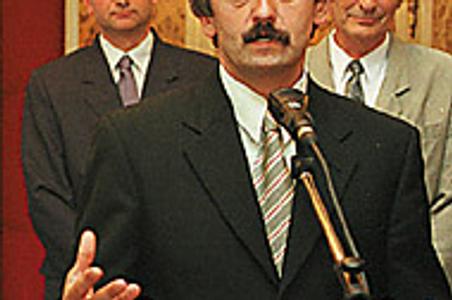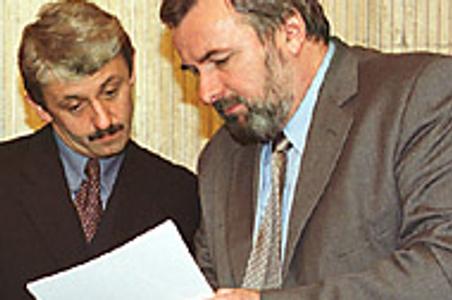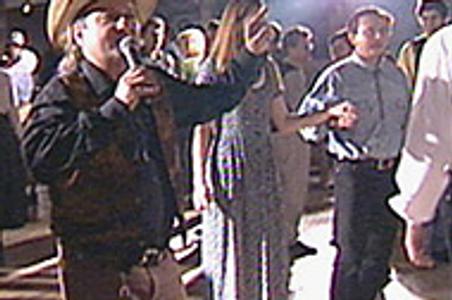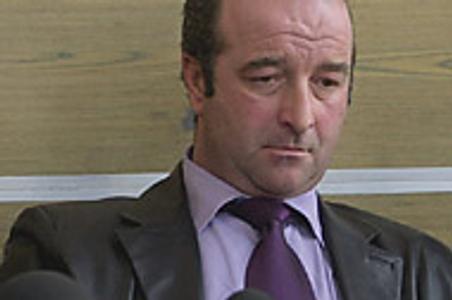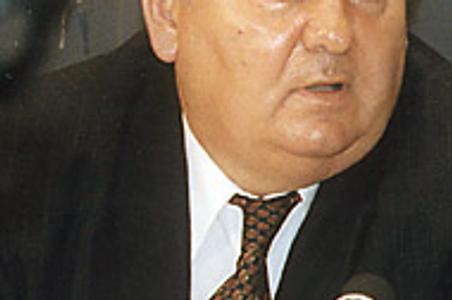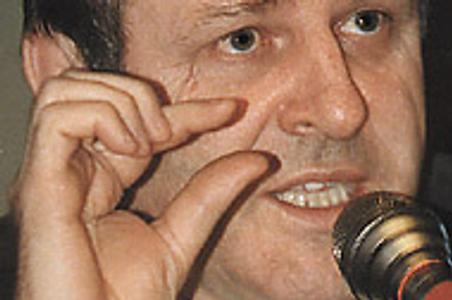Archive of articles - April 2001, page 4
If you desire to read an old article, use the search bar or select the publication date.
Letters to the Editor
Dear Readers,The Slovak Spectator has started a new web discussion site at www.slovakspectator.sk where readers can react to stories, and to each other's feelings about what they have read. We encourage people to contribute to the site, and here publish a selection of the many comments that have been received. Readers can still send letters to the editor directly at slspect@internet.skBSA tactics not the solution to software problemsCan we get 'family' land back?
Corruption fight under fire
It's been well over a year now since Prime Minister Mikuláš Dzurinda first announced his government's National Fight Against Corruption programme February 28, 2000. But despite promises of a crack-down on corruption, businessmen, analysts and even members of parliament [MPs] say that "almost nothing has changed"."Corruption still exists, and bribes are paid anywhere where private businesses need state approvals or licences, at customs offices, and so on (see chart, page 2)," said Karol Pavlu, head of the Slovak Entrepreneurs Association (ZPS).Since Dzurinda announced the anti-corruption programme, he added, disgruntled businessmen have seen little if any improvement. "Vague rules when working with state bodies and a lack of transparency in the state administration still result in frequent corrupt practices."
Lučenec investment park: a seven-year itch
Lučenec mayor Jozef Murgaš works 700 metres above ocean water that was trapped in the earth's crust 12 million years ago. The ocean was covered during an epoch of dense volcanic activity, which over millennia deposited a rich vein of silicates unrivalled in central Europe.Murgaš and local entrepreneurs say they completed a plan over two years ago to exploit the silicates and draw massive investment into the Lučenec area, where unemployment hovers around 30%. They even have investors waiting to move in. But they lack one important tool: laws allowing the building of industrial parks."We're all very frustrated," says Murgaš. "We started working on this seven years ago, and have been waiting for the laws ever since."
Top Pick: Traditional Country Ball at Danube
Men in cowboy outfits will twist girls in long skirts to the strains of "O, Susannah", trained professionals will wield lassos, and craftsmen will sell hand-made leather belts, hats and wallets at the traditional Country Ball on the Danube embankment at Park Kultúry a Oddychu (PKO) on Saturday, April 21.Following a 20-year tradition, the night-long ball brings a slice of American culture to Slovakia. Slovak bands Žobráci (Beggars), Country Team, Slávo Kmeť & Band, Wrkoč (Pony Tail) and Louiziana will shake and rattle PKO's "Big Saloon" along with dance groups Petronella, Slniečko (Baby Sun) and Czech Quadrilla. The evening's host, Vlado Grežo, will teach visitors the basic steps of typical country and western dances.The Tramp Song and Kalunet folk-country bands as well as the Funny Fellows Old-Time Band, will play in PKO's "Small Saloon".
News Briefs
US Ambassador Spielvogel ends Slovak missionVisa regimes dropped for SlovaksPeter Weiss says Cuba is ready for changeSVS revises ban on bovine products
ST turns down promissory notes deal
When Austrian businessman Gunter Schuster presented himself on April 2 at the Bratislava headquarters of Slovenské telekomunikácie, the Slovak telecoms monopoly, he was hoping that a long-running court battle between his CDI radio firm and ST could finally be brought to an end.Holding a promissory note for 500 million crowns ($10 million), allegedly signed by a former ST director named František Eke, Schuster expected that the legal 'IOU' would bring ST executives to the bargaining table over a 2.5 billion crown ($50 million) debt Schuster claims ST owes CDI for cutting off the Austrian radio station's broadcasts in 1996. CDI claims to own another 24 billion crowns in ST promissory notes, but has indicated it will return them to ST if the telecom firm settles its suit.
Bardejov given new employment hope
The employment hopes of the north-east Slovak town of Bardejov were lifted April 4 after Labour Minister Peter Magvaši announced that two foreign firms were expected to invest close by, creating 1,500 new jobs.An unnamed Czech glass producer and a multinational shoe firm based in Austria are currently negotiating with the government on separate projects which will bring 400 million Slovak crowns into the town. According to the minister, a memorandum of understanding on the Austria-based firm's investment is due to be signed at the end of April.With Bardejov's jobless rate hovering around 30%, the investments will be a massive boost to the community. The new hope has come after the local government and the Phare-funded Agency for Industrial Development and Revitalisation (AIDR) together promoted the town as an investment destination. The team used the production halls of Bardejov's once prosperous, but now bankrupt, shoe-maker JAS Bardejov as the fulcrum for their efforts to attract investors.
Unarmed TÚ searching for weaponry in regulatory battle
Milan Luknár has to get by on short rations. A career telecoms professional since graduating from Technical University in Prague in the 1960's and the current head of the Slovak Telecoms Office (TÚ), which regulates the country's telecoms market, he really has no other choice.Ministry and state-firm bosses typically have chauffeur-driven Audis and BMWs (Telecoms Minister Jozef Macejko is privileged with a blue BMW); Luknár gets an early-90's black VW Passat. Most state bodies have their own headquarters near the centre of town; Luknár and his colleagues sit in a building belonging to Slovak Telecom (one of the very firms they are supposed to be regulating) in an industrial part of town.He's even disciplined when drinking coffee. As his secretary places a small cup in front of him, Luknár looks sheepishly from the mug filled only halfway, explaining "I take a little less water with my coffee".
ST: Monopoly laws should be upheld
While it has been almost six months since Deutsche Telekom was written into the business register as the new owners of 51% in Slovenské telekomunikácie (ST), Slovakia's fixed line monopoly provider, the new German executives at ST have made very few public appearances as yet. The Slovak Spectator sat down to breakfast with three Slovak ST officials, one of whom, products and marketing director Pavol Bojňanský, answered the following questions regarding ST's market strategy.
Oh, those bills!
The arrest last week of two key figures in a 1998 plan to defraud the Slovak state gas utility SPP of millions of dollars has given fresh impetus to police efforts to solve one of the country's most infamous financial crimes. However, police say that despite recent progress in the case, the gas utility may yet face untold millions in claims from holders of blank bills of exchange signed by former SPP Director Ján Ducký in 1998.Ivan M., a former SPP financial director, was arrested at a Slovak border crossing with Austria late on March 29 and charged with two counts of fraud. The ex-SPP employee, who under Slovak law cannot be named in the media until he has been found guilty of a crime, is charged with masterminding the payment of 350 million Czech crowns ($9.2 million) in bills of exchange signed by Ducký to a Czech firm named Sezooz Group, in return for 'technical equipment' that was never delivered. Ivan M. was released from custody March 30, and will be investigated while at liberty.
Mečiar: US offered me political asylum
Three-time former Prime Minister Vladimír Mečiar told a reporter from Slovakia's Playboy magazine that he had been offered asylum in the US. When asked by a reporter for TV Markíza who specifically had extended the offer, he said he did not remember.When contacted by The Slovak Spectator April 2, US Embassy press attaché Paul Oglesby said "the US government did not offer political asylum to former Prime Minister Mečiar". Asked if Mečiar currently held a visa allowing him to travel to the US, he said: "The US Embassy cannot answer any questions in regards to who holds a visa."The following are exerpts from Playboy's interview with Mečiar, which appeared in the magazine's April, 2001 edition:
Holocaust victims suffer legal setback
A suit brought by representatives of Slovak Jewish Holocaust survivors against the German government was thrown out by a Berlin district court March 28 because the organisation did not have "the right to represent" Slovak Holocaust victims, the German press agency Deustche Presse Agentur reported.The group vowed to continue to fight for compensation for Jews deported from Slovakia during World War II, only 282 of whom returned.The legal action stems from deportation fees - 500 German Marks - the Slovak government paid to Germany for 58,000 of the 70,000 Jews deported during the Holocaust. Slovakia was the only state to pay such fees, which were accumulated from seized Jewish property.
Parliament to decide issue
Slovakia is to be divided into 12 new regions, decided the Dzurinda government at a special session Sunday April 1. After a four-hour debate, 12 of 20 cabinet members voted in favour of a new plan to divide the country, a scheme known as 'public administration reform'. The reform will also delegate state powers to be assigned the new regions, and create a new level of elected regional governments, in keeping with a European Union principle that government be brought as close to the people as possible.Despite the cabinet decision, Prime Minister Mikuláš Dzurinda warned after the session that "the game hasn't been won yet", in reference to the fact that for the reform plan to take effect, Slovakia's 150-seat parliament must first approve it.
Ministry hopeful VÚB to match SLSP
Head of the Finance Ministry's Bank Privatisation Unit Juraj Renčko has said that he believes the government can achieve a successful sale of Slovakia's second largest bank - Všeobecná úverová banka (VÚB) - on a par with last December's 18 billion crown privatisation of the state's 87% stake in Slovenská sporiteľňa (SLSP)."We are very optimistic that VÚB's sale can be a success, and as good as that of SLSP," he told The Slovak Spectator April 3. "The bank is a very different one to what it was just two or three years ago. It has great potential for growth."The statement comes as two banks - Italian Banca Commerciale Italiana and French Societe Generale - carry out due diligence at VÚB as the state looks to off-load a 69% share in the finance house. But while VÚB saw the majority of a 100 billion crown state extraction of non-performing and classified loans in the sector come out of its own portfolio, many analysts have said that the bank lacks the potential of the deposit account-oriented SLSP.
Car sales signal economy on rebound
In what analysts have said is yet another sign of Slovakia's improving economy, passenger car sales are on a strong rebound as restrictive economic measures introduced by Mikuláš Dzurinda's government over the past two years come to an end.In the first two months of this year, car purchases surged 29% over the corresponding period a year ago, following a cumulative decline of over 20% in the 1998-2000 period when restrictive import surcharges and taxes on car imports from most EU countries were in place.The strong demand for new cars is a strong sign, experts say, that economic recovery is gaining speed in Slovakia. "While the [car sales'] numbers are not as strongly indicative of economic development as they are in the US, for instance, they are used as a preliminary indicator in forecasts here," said Ľudovít Ódor, macroeconomic analyst at Československá obchodná banka (ČSOB).
Slovalco deal moves ZSNP sale closer
Three months after celebrating its 50th anniversary, the state industrial monolith, aluminium smelter Závody slovenského národného povstania (ZSNP), took a crucial step towards future consolidation as it sold a 41.5% stake in its most viable asset - daughter company Slovalco - for $76.5 million to minority shareholders Norwegian Hydro Aluminium, the world's fifth largest aluminium firm, and the European Bank for Reconstruction and Development (EBRD) on March 30.The deal, which gave Hydro Aluminium and EBRD a combined 66% stake in Slovalco [Hydro added 5.5% to an existing 14.5% stake while the EBRD took an extra 36% on top of a previous 10% holding], was largely viewed as a pre-condition for a long-awaited ZSNP group restructuring and subsequent privatisation.The FNM state privatisation agency expects the restructuring to start next month and the privatisation to go ahead in autumn this year. The sale, which was also the EBRD's largest investment in Slovakia, had been a pre-condition for a larger two year $80 million expansion project the EBRD and Norwegian firm (both of whom have held stakes in the firm since 1994) are to launch this year.
Top Pick: Whose children are these?
A United Nations declaration says that all children have the right to love, tolerance, education, name and nationality, social security and protection from racism and tolerance.An April exhibition of photographs and art at Bratislava's Bibiana children's art house asks the frank question: Do these rights count for Roma children too?"For every ten Slovaks there is one Roma in Slovakia," said exhibition creator Eva Čárska. "Roma children also need love, tolerance and protection of their basic needs. We [Slovaks] need to realise that these are our children too."Whose Children are These? features photographs from Roma settlements in eastern Slovakia by photographer Jozef Schon. Neither sentimental nor critical, they show Roma children - playing in snow, retrieving water from a well, bathing in a river - seemingly oblivious to the surrounding poverty.
Stocks down but blue chips in black for 2000
Slovak stocks ended March 2001 trading at lower levels, generally unmoved on the basic financial results of flagship companies. The SAX opened the month at 89.35 but in the course of March dropped 8% to 81.89 points.The most traded stock on the BSE floor and OTC (Over-the-Counter) market, Slovnaft, announced unaudited financial results for the previous year showing an improved performance on 1999. Slovnaft recorded a profit of 2.57 billion crowns ($51 million), improving on a loss of 2.48 billion crowns in 1999. Despite the positive result the market was less than bullish on the issue; during the month its price fell from 470 crowns to 425 crowns at the end of the first quarter. Since the FNM privatisation agency announced its intention to sell or exchange its 4.5% stake in Slovnaft for FNM bonds, its price has dropped 17%.
- The law changed. Our family papers were ready. Now my kids are Slovak citizens
- Legendary captain Zdeno Chára inducted into IIHF Hall of Fame Video
- Maria Theresa on the banks of Bratislava
- Slovak female triathlete shatters barriers with historic win at Himalayan event
- The Kremlin’s security agency has a Russian contractor in Slovakia - no one has noticed
- Slovakia loses another EV model to Spain as Stellantis chooses Zaragoza over Trnava
- Liberal MP's boxing challenge backfires as far-right MEP seizes the moment
- No more photos or bank statements? Slovakia moves to ease residence process
- The law changed. Our family papers were ready. Now my kids are Slovak citizens
- Maria Theresa on the banks of Bratislava
- The Kremlin’s security agency has a Russian contractor in Slovakia - no one has noticed
- Slovak female triathlete shatters barriers with historic win at Himalayan event
- Slovakia loses another EV model to Spain as Stellantis chooses Zaragoza over Trnava
- From eight to thousands of runners. How Košice marathon rose to prominence Photo
- No more photos or bank statements? Slovakia moves to ease residence process
- Iconic Slovak barn still draws crowds. Without donors, it might have been lost Photo
- The law changed. Our family papers were ready. Now my kids are Slovak citizens
- Maria Theresa on the banks of Bratislava
- No more photos or bank statements? Slovakia moves to ease residence process
- Weekend: Celebration of fun comes to Malacky Photo
- Top 10 events in Bratislava for foreigners
- 3 free things to do in Bratislava in the next seven days
- Slovakia loses another EV model to Spain as Stellantis chooses Zaragoza over Trnava
- Slovak female triathlete shatters barriers with historic win at Himalayan event
- The law changed. Our family papers were ready. Now my kids are Slovak citizens
- Maria Theresa on the banks of Bratislava
- No more photos or bank statements? Slovakia moves to ease residence process
- The Kremlin’s security agency has a Russian contractor in Slovakia - no one has noticed
- Fico praises China and Vietnam as models, says liberal democracy has failed
- News digest: Violent gang in Bratislava is under arrest
- A mayor resigns over €2.7 million fraud scandal at town hall
- Top 10 events in Bratislava for foreigners
- Legendary captain Zdeno Chára inducted into IIHF Hall of Fame Video
- Liberal MP's boxing challenge backfires as far-right MEP seizes the moment
- The law changed. Our family papers were ready. Now my kids are Slovak citizens
- News digest: Prosecutor seeks jail for NBS Governor Kažimír as his political support wanes
- Slovakia loses another EV model to Spain as Stellantis chooses Zaragoza over Trnava
- Slovak female triathlete shatters barriers with historic win at Himalayan event
- Weekend: Celebration of fun comes to Malacky Photo
- News digest: Fico’s bloc wants to save money by restricting electoral access More articles ›


